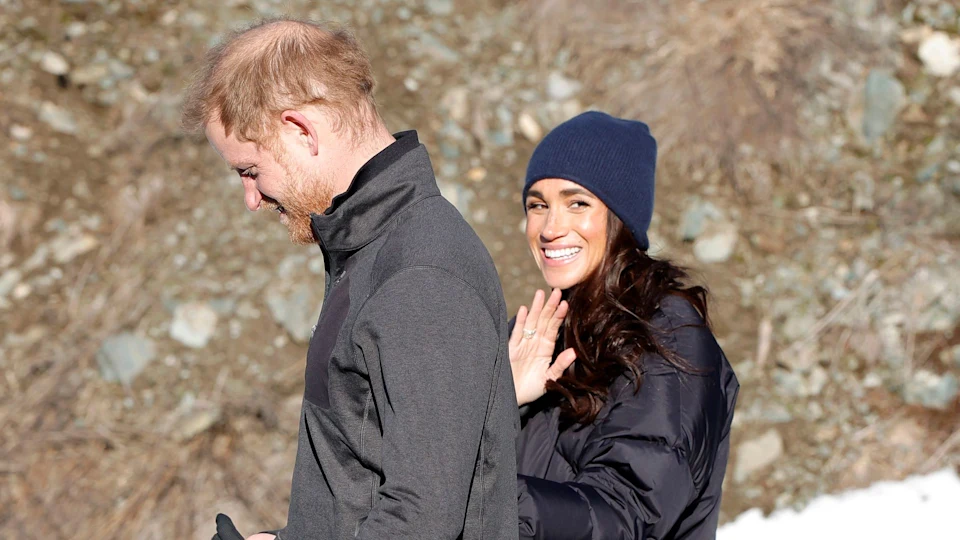Day two in Canada with the Duke and Duchess of Sussex dawned with a wake-up call from my friendly hotel receptionist, a very hot shower and the decision to wear more layers and drink more coffee than day one.
All those decisions paid off, as I arrived back in Whistler at 11am with a high of -2c (warmer than day one!) ready to meet more 2025 hopefuls – and watch Prince Harry bravely take on the skeleton run.
The death-defying event sees men and women throw themselves down onto what is, essentially, a torso-sized oven tray and then slide at over 100 mph down an icy tube.
If you’ve never watched the skeleton run, do yourself a favour and YouTube some videos after you’ve finished reading this.

I heard that he was planning to have a go at the event alongside others at the training camp but doubts abounded; would the royal really take on such a dangerous activity? It was silly to even question it though – if I’ve learned anything from these past few days, it’s that Prince Harry is never one to back down from a challenge, and that if a competitor in the Invictus Games is having a go, so is the Prince.
And sure enough, over the loudspeaker came the name ‘D.O.S’ and seconds later, he was speeding around the final corner at 99 km ph, arms tucked in close to his body and helmet secured around his head as he bounced across the track left to right before coming to a stop.
The moment was captured by the press and photographers, jostling to get the best angle (I may have a new nemesis…) while on the other side was wife Meghan, who had arrived moments before, with a phone in her hands ready to capture the moment her husband raced past her.
With her hand over her mouth, she watched on, before giving a little shiver as she realized he had made it back down safe. Understandable, to be honest.
As for the Duke, he called out how “great” the experience was, greeting the other participants as they arrived back at the end of the track following their turn, – including Will Reeve, the son of Superman star Christopher Reeve – and then decided once wasn’t enough and he wanted a second turn to hit the 100km ph mark.
“Even better! I’m going ’til the sun goes down!” he exclaimed after I asked him how his second run went, with Meghan joking: “No way!” when asked if she would take a turn.
That can-do spirit from the Duke, however, is what has truly endeared him to so many of the participants of the Games, which have been taking place since 2014.
One of those who had a go down the slope was Peacemaker Azuegvbulam, a Nigerian hopeful who took part in the 2023 Games in Dusseldorf and won Gold in the Powerlifting for the Nigerian team, and who shared how much he “appreciated their efforts to bring the Invictus Games to the doorsteps in Nigeria,” and the “love” the pair have shown his team.
The soft-spoken 27-year-old was injured in 2020 during a mission to capture Boko Haram terrorists, losing part of his left leg, and he admitted that after the injury his “life turned the other way around”.
But after he was introduced to the Games by the Nigerian team Captain, he shared that the opportunities kept him busy and he was “no longer lonely again”.
“I got new friends, people that really care about me, and we share our stories together. Emotionally I was getting myself back [and] physically, I was getting fit, [and I realized] I’m capable of doing great things,” he told HELLO!
It was a sentiment also shared by Rasmus Penno from Estonia, who revealed that these Games are important because of the ways it helps everyone, including families support each other: “When my family or friends sit on the track and watch what I’m doing, it gives me so much more to push myself.”
For many of these athletes, this is the first time they have seen snow, and so the opportunity to feel the cold wind whipping their cheeks and to feel the soft powder under their feet is just as important as learning the skill itself. And it’s clear that seeing the Duke also experience these elements and events enforces that feeling of family, which I wrote about in my day one experience and which continues to be the theme for day two.
Heading back down from the center to our waiting bus, and the two-hour drive back to Vancouver, I couldn’t help but think of Bert Labonte, the husband of Joanna Labonte, who was on our bus with his wife and had spoken earlier in the day.
The father-of-two had revealed how beautiful it was to watch his wife, who has served in the Canadian army for over 30 years, grow and regain her confidence thanks to the Games, and his palpable emotion as soon as he stood with the microphone in his hand left me with the overwhelming sense that I was about to cry as well.
Joanna, jokingly, took some exaggerated calm breaths, and Bert composed himself and revealed how important it was for him and their 15-year-old son Campbell to feel included in her journey and the Games experience, and how it didn’t matter where anyone was on their personal journey, the Games were there to support you regardless.
It was that moment for him that made him realize how much these Games would change their lives, and for me, it was more confirmation that the Invictus Games are a family, regardless of nation, injury, or background. One I’m starting to feel a part of, as well.

